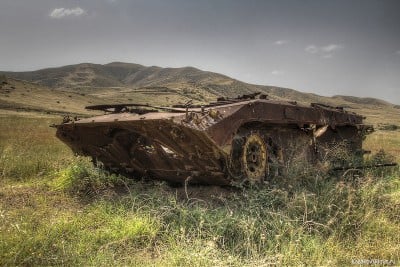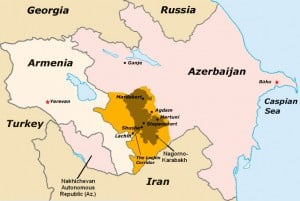How the West Plans to Prevent the Shanghai Cooperation Organization (SCO) from Mediating in Nagorno-Karabakh

The first two parts of this series explained why the OSCE Minsk Group is inadequate for resolving the Nagorno-Karabakh conflict and why the SCO is the only realistic alternative for doing so. This final piece will look at how the US intends to stop that from happening, and what Azerbaijan can do to safeguard this process and increase its chances of success.
The Problems Ahead
Seeing as how the SCO’s mediation of the Nagorno-Karabakh conflict would not only replace the West’s influence in the Caucasus, but also work out to the benefit of the four major involved players, it should be expected that the US and its European allies will do their best to obstruct this process and prevent its successful completion. Here are three of the possible ways in which it can do this:
An Armenian Coup And Continuation War:
 The US is famous for its coups, and given Victoria Nuland’s latest trip to the Caucasus, it cannot be discounted that the villainess of EuroMaidan has similar sinister plans in mind for the region. Azerbaijan has been steadily defending itself from this scenario, most notably with the closing of the illegally operated Radio Free Europe/Radio Liberty office in Baku, and the government in Georgia is pro-Western enough with its NATO and EU integrational plans to be unaffected by this form of plotting. That leaves Armenia as the weakest link in the region and the country most vulnerable to an external regime change attempt. The reasons for this are simple – the US wants to disrupt the Russian-led Eurasian Union (of which Armenia just joined at the beginning of the year) and reignite a war in Nagorno-Karabakh that would open up a new front of regional destabilization that can be directed against Russia.
The US is famous for its coups, and given Victoria Nuland’s latest trip to the Caucasus, it cannot be discounted that the villainess of EuroMaidan has similar sinister plans in mind for the region. Azerbaijan has been steadily defending itself from this scenario, most notably with the closing of the illegally operated Radio Free Europe/Radio Liberty office in Baku, and the government in Georgia is pro-Western enough with its NATO and EU integrational plans to be unaffected by this form of plotting. That leaves Armenia as the weakest link in the region and the country most vulnerable to an external regime change attempt. The reasons for this are simple – the US wants to disrupt the Russian-led Eurasian Union (of which Armenia just joined at the beginning of the year) and reignite a war in Nagorno-Karabakh that would open up a new front of regional destabilization that can be directed against Russia.
The current authorities in Yerevan would not pursue a continuation war without Moscow’s blessing, and for the reasons previously outlined above, Russia is absolutely opposed to this course of action. Not only that, but Russia’s Collective Security Treaty Organization guarantee that it provides Armenia does not extend into Nagorno-Karabakh or the surrounding regions, meaning that under any resumption of hostilities (and provide that Azerbaijan does not attack Armenia proper), Russia would not directly intervene to help Armenia. Therefore, the only course of action for the US and its allies is to stage a coup in Armenia that would bring extreme nationalists to power, following the Ukrainian model spearheaded by Nuland. These individuals would disobey Russia’s wishes for peace and promptly instigate a war, leading to disastrous repercussions for the region and the prolongation of American influence in the Caucasus.
EU Blackmail:
The closer that Baku moves towards the SCO, the more likely it is that Brussels will step up its rhetoric against the country. It’s already chided the government for its closing of the illegally operated and provocative Radio Free Europe/Radio Liberty and the arrest of subversive regime change elements, but the next step in this offensive will be for the EU to threaten the suspension of Azerbaijan’s European integrationist hopes.
 It must be understood, however, that Azerbaijan will probably never join the EU anyhow, seeing as how the bloc isn’t even interested in Ukraine or Georgia at the moment. While the reasons for their disinterest in war-torn and devilishly corrupt Ukraine are obvious, things aren’t so clear when it comes to Georgia, which is arguably a lot more stable and prosperous. Recent reports indicate that neither of them will be even be offered visa-free travel with the bloc this year, which is sure to disappoint the pro-Western elements in both of these countries. The only realistic explanation for Georgia’s stalemated progress is that the EU has reached a limit towards its expansion and is no longer genuinely interested in spreading its institutions for the time being, either out of political or practical considerations.
It must be understood, however, that Azerbaijan will probably never join the EU anyhow, seeing as how the bloc isn’t even interested in Ukraine or Georgia at the moment. While the reasons for their disinterest in war-torn and devilishly corrupt Ukraine are obvious, things aren’t so clear when it comes to Georgia, which is arguably a lot more stable and prosperous. Recent reports indicate that neither of them will be even be offered visa-free travel with the bloc this year, which is sure to disappoint the pro-Western elements in both of these countries. The only realistic explanation for Georgia’s stalemated progress is that the EU has reached a limit towards its expansion and is no longer genuinely interested in spreading its institutions for the time being, either out of political or practical considerations.
It is impossible for Azerbaijan to move closer to the EU without Georgia demonstratively doing so as well, due to the geographic limitations imposed on Baku. This means that for as long as Georgia is not an official member of the bloc, Azerbaijan should not take the EU’s blackmail seriously, since its prospects of joining are even more distant than Tbilisi’s. The more that Brussels talks about Baku ‘moving away from Europe’, the more desperate it sounds, and its displeasure reveals that the country is actually heading in the right direction by pursuing multipolar policies that scare the unipolar West.
Information Warfare:
Finally, the US and its political friends will certainly resort to a heated information war to obstruct Azerbaijan’s acceptance of SCO deliberation over Nagorno-Karabakh. They will conduct their operations in three ways, each of which is intended to inflict a different degree of harm on the country:
* worsening Azerbaijan’s image in the eyes of the ‘international community’ (the West);
* weakening Azerbaijan’s multipolar relations with Russia, China, and Iran;
* and provoking the people of Azerbaijan to stage a Color Revolution against the government.
All of these different layers of the information campaign are expected to destabilize the country and prevent its constructive interaction with the SCO. The West is afraid of being replaced by the non-West in general, and in negotiations over Nagorno-Karabakh in particular, hence why it aims to drive a wedge between Azerbaijan and its multipolar partners.
The Way Forward
 In order to make this vision of a peaceful Nagorno-Karabakh settlement a reality, it is imperative that Azerbaijan follow these three recommended suggestions:
In order to make this vision of a peaceful Nagorno-Karabakh settlement a reality, it is imperative that Azerbaijan follow these three recommended suggestions:
Strategic Patience:
Azerbaijan must exercise restraint in not overreacting to any provocations (military, economic, political, social) by any party (US, EU, Armenia). These are predicted to increase and become more nefarious in the months to come, but it must be recognized that their goal is simply to derail Azerbaijan’s multipolar integration into the SCO and to prolong unipolar influence over the country. If Azerbaijan can maintain its composure during these testy times, then the benefits will surely be worth it.
Cautious Curiosity:
The next thing is for Azerbaijan to express interest and willingness to involve the SCO grouping in Nagorno-Karabakh consultations, while not explicitly rejecting the OSCE Minsk Group or outwardly indicating that its role will be replaced. It is important at this point to not prematurely provoke the US and EU any more than they already are, and by coyly leaving open the possibility that the Minsk Group could always be returned to, it is intended that Azerbaijan will increase its diplomatic leverage with the SCO and create a sense of urgency that can be channeled to Baku’s benefit.
Full Commitment:
Finally, if the SCO decides to mediate the Nagorno-Karabakh peace process, it is absolutely integral that Azerbaijan seizes the initiative and fully commits to the endeavor. The more quickly that the process moves, the less likely it is that diplomatic stagnation would set in or external provocations aimed at sabotaging the talks would succeed. While still safeguarding its interests, Azerbaijan needs to place complete trust in the renewed negotiations and realize that they present the only realistic alternative of a peaceful settlement in Nagorno-Karabakh.
Concluding Thoughts
Russia and China’s sincere interest in Eurasian stability, and the former’s guiding influence over Yerevan’s affairs, mean that it is very likely that SCO mediation could bring about a successful resolution of the Nagorno-Karabakh conflict. It’s exceptionally important for all parties to see this as the only opportunity for breaking the stale mold of the failed OSCE Minsk Group format and productively moving forward with the peace process. The US and France have been impeding a resolution to this issue for years now, and it’s about time that Azerbaijan looks elsewhere for a more pragmatic (and just as powerful) partner in substituting for their role, hence the suggested inclusion of China via the SCO framework.
As the saying goes, if “insanity is doing the same thing over and over again and expecting different results”, then it’s insane for anyone to expect the OSCE Minsk Group to yield any positive dividends in the future. Accordingly, it’s appropriate to change the grounds on which peace talks are conducted, and move away from the broken Western-centric structure and towards the new, fresh non-Western one that the SCO is promising. This new format is not guaranteed to succeed, but at the very least, it provides a more promising chance at doing so than the old way of doing things, and this makes it well worth the effort of exploring in order to hopefully heal this long-standing regional wound.
Andrew Korybko is the political analyst and journalist for Sputnik who currently lives and studies in Moscow. This and forthcoming articles on Nagorno-Karabakh settlement were prepared for Azerbaijani portal Moscow-Baku and published in English exclusively at ORIENTAL REVIEW.
Notes:
Source in Russian: Moscow-Baku
English original text courtesy of the author.

